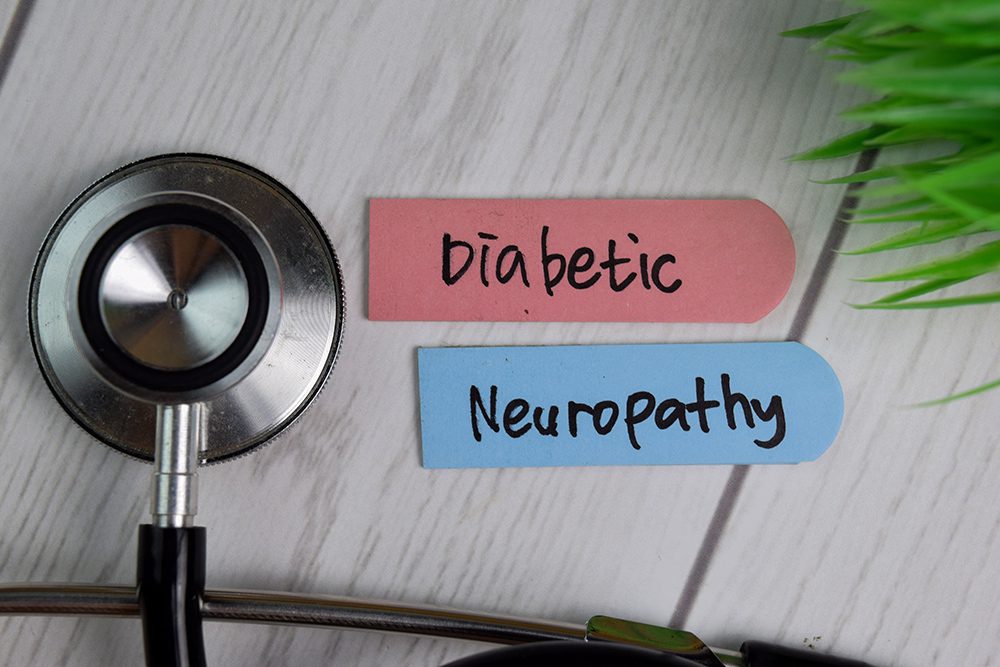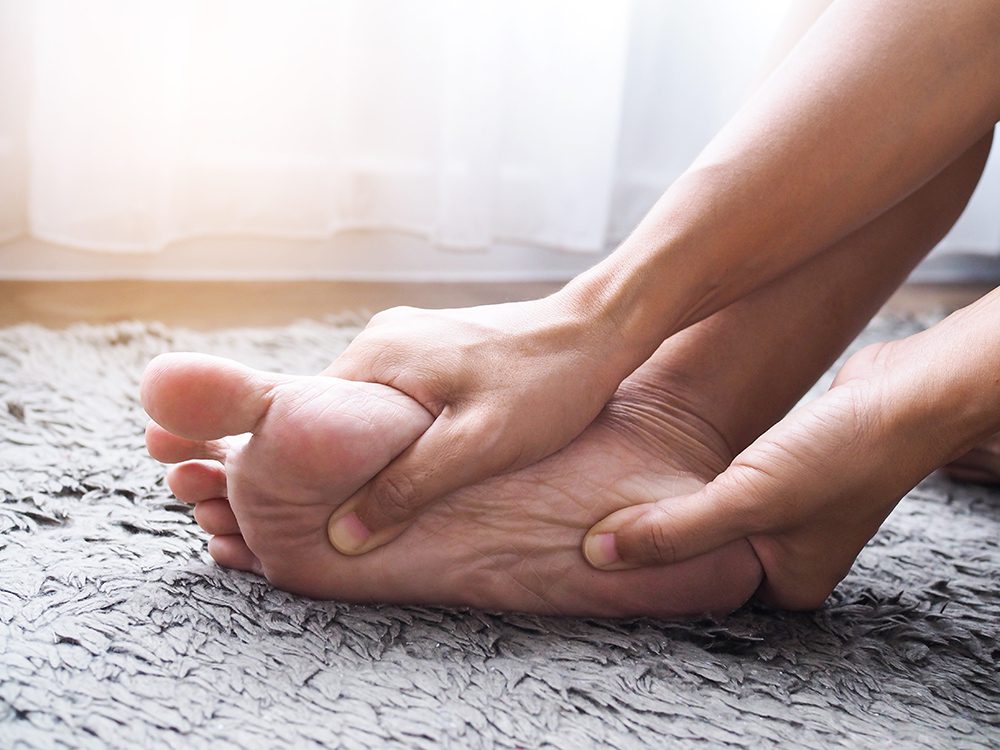Focal neuropathy, also known as mononeuropathy, affects a single nerve in your body. In most cases, it occurs in the thigh, foot, or wrist. It may also affect nerves controlling your eye muscles, as well as those on your back and chest.
Focal neuropathy is comparatively less common than autonomic and peripheral neuropathy. It typically occurs in elderly people suffering from diabetes. Often, focal neuropathies occur suddenly, but they subside on their own within six to eight weeks.
Focal neuropathies are of various types and require a variety of different treatments. Here, we’ve created an in-depth guide to help you understand the causes and symptoms of focal neuropathy:
What are the Different Types of Focal Neuropathies?

Diabetic focal neuropathies are categorized into the following types:
Entrapments
Entrapment, often referred to as entrapment syndrome, is a pretty common type of focal neuropathy. These occur due to compressed or trapped nerves in specific areas. It includes the area where the nerve passes via narrow passages between tissues and bones.
Research reveals that people who have diabetes are more likely to experience entrapments. The most common type of entrapment is referred to as carpal tunnel syndrome.
Even though less than 10% of people with diabetes experience symptoms of CTS, at least 25% of diabetic patients face nerve compressions in their wrist.
Plexus Neuropathy
The Brachial Plexus is a lineage of nerves originating from your neck. These nerves then branch off and join other nerves responsible for controlling movement and sensation in your upper limbs.
These include your hand, forearm, arm, and shoulder. BPI or Brachial Plexus Injury is an umbrella term for numerous conditions that can impair the functioning of your brachial plexus nerve network.
In most cases, pediatric or adult BPI is caused by trauma or birth, such as vehicular/motorcycle accidents, stab or gunshot wounds, or blunt trauma. It can also be due to compressions, such as growing tumors, thickened muscles, genetic mutation, or inflammatory processes.
Its most common symptoms include pain, loss of sensation, weakness in your muscles, and paralysis.
Other Focal Neuropathies
Focal neuropathies that lack trapped nerves are comparatively less common. Other focal neuropathies typically affect older people.
These include cranial neuropathies that occur in the nerves present in your head. These can lead to eye problems, as well as issues with your face’s muscles.
In addition, symptoms and signs of each focal neuropathy depend on the specific nerve affected.
What Are the Causes of Focal Neuropathy?
With time, high blood glucose or blood sugar and high levels of fats, such as triglycerides in your blood due to diabetes, can cause damage to your nerves.
They can also harm the small blood vessels of your body that nourish the nerves. Ultimately, this leads to focal neuropathy.
The Common Signs and Symptoms of Focal Neuropathy
Signs and symptoms of focal neuropathy vary depending on the underlying issue. Here, we discuss the differences, as well as general symptoms of focal neuropathy:
Entrapments
Focal neuropathies due to trapped nerves can cause symptoms and signs that worsen with time. These include:
- Pain, numbness, and tingling in your middle finger, thumb, and index finger due to carpal tunnel. It may also weaken your grip
- Ulnar entrapment can lead to pain, tingling, and numbness in your ring and little finger
- Peroneal trap causes weakness in your big toe, as well as pain on the outside of your lower leg
Focal Neuropathies Lacking Trapped Nerves

Focal neuropathies where your nerves are not trapped occur suddenly but improve after several weeks. You may experience pain and additional symptoms depending on which nerve is affected in the following areas:
- Foot
- Hand
- Leg
- Torso
Cranial Neuropathies
Cranial neuropathies affect nerves present in your head. They can cause symptoms including:
- Aching behind a single eye
- Double vision
- Paralysis on one side of your face
- Problems when focusing your eyes
How do Doctors Diagnose Focal Neuropathies?
Focal neuropathy has multiple potential causes. Therefore, your doctor may recommend that you get a physical exam. Apart from that, diagnosing focal neuropathy includes:
A Full Medical History
The doctor will contemplate your entire medical history, including your lifestyle, drinking habits, symptoms, exposure to toxins, and family history.
Neurological Examination
It requires an in-depth assessment of muscle strength and tone, posture and coordination, tendon reflexes, and the ability to feel various sensations.
Tests
Your doctor may recommend the following tests:
- Blood Tests- to detect vitamin deficiencies, abnormal immune function, diabetes, and other potential conditions
- Imaging Tests- CT or MRI scans to spot pinched or compressed nerves, abnormalities affecting your bones and blood vessels, herniated disks, and tumors
- Nerve Function Tests- EMG records electrical activity to detect nerve damage
- Nerve Biopsy- Where your doctor removes a portion of a nerve, typically your sensory nerve, to identify possible abnormalities
- Other Nerve Function Tests- These include an autonomic reflex screen to record your autonomic nerve fibers working, a sweat test to measure your body’s ability to sweat, and sensory difficulties in recording how well you feel vibrations, touch, heat, and cooling
- Skin Biopsy- Your doctor will remove a small portion of skin to find reductions in your nerve endings
What are the Treatments for Focal Neuropathy?
Your doctor determines your treatment plan based on the underlying disorder. For instance, if it’s caused by diabetes, your doctor will control your blood glucose. If it’s due to a vitamin deficiency, you have to start taking supplements to counter it.
In most cases, doctors use different treatment methods simultaneously for enhanced efficacy. These include:
Pain Relievers
Your doctor may recommend several over-the-counter pain medications. These include anti-inflammatory drugs to relieve mild symptoms or pain killers for severe symptoms.
Medications that contain opioids, such as Oxycontin and Conzip can lead to addiction and dependence. Make sure to discuss possible side effects with your doctor before taking any pills.
Anti-Seizure Medications

Certain medications like Gabapentin and Pregabalin, such as Neurontin, Lyrica, and Gralise, treat epilepsy.
However, you may use these medications to alleviate nerve pain but experience side effects such as dizziness and drowsiness.
Tropical Treatments
Capsaicin cream includes an active substance present in hot peppers to relieve focal neuropathy symptoms. You may experience some irritation at first, but this typically subsides with time.
If you’re unable to tolerate it, consider using Lidocaine patches. You can plaster them directly onto your skin to gain pain relief. Potential side effects include numbness, drowsiness, and dizziness.
Antidepressants
Several tricyclic antidepressants, including doxepin and amitriptyline, help alleviate neuropathic pain. These medicines interfere with your brain and spinal cord’s chemical processes to put a brake on the pain signals.
Various serotonin and norepinephrine reuptake inhibitors are also helpful in easing focal neuropathy due to diabetes.
Remember, these medicines can cause side effects such as dizziness, drowsiness, changes in appetite, constipation, nausea, and weight gain.
Herbs
Several herbs, including primrose oil, can assist in reducing neuropathy pain due to diabetes. However, herbs can mess with your medications, so discuss them with your doctor before using them.
Amino Acids
Amino acids are beneficial for people who have diabetes or underwent chemotherapy. You may experience side effects like nausea or vomiting.
What Can Focal Neuropathy Lead to?
Your nerves play various vital functions in your body. As a result, focal neuropathy can cause several complications, including:
Digestive Issues
Neuropathy can damage your nerves, which negatively affects the organs in your digestive system. It may lead to the following symptoms:
- Constipation
- Diarrhea
- Impaired hunger
- Nausea
- Vomiting
It may even affect how food moves within your intestines and stomach, leading to poor nutrition and severe blood sugar levels.
Sexual Dysfunction
Autonomic neuropathy can impact your sexual organs too. It leads to:
- Erectile dysfunction in males
- Impaired stimulation in both genders
- Issues with sexual arousal, as well as vaginal lubrication in women
Excess or Reduced Sweating
Damage to your nerves can affect sweat gland function. It can cause anhydrosis (reduced sweating) or hyperhidrosis (excess sweating). Dysfunctional sweat glands ultimately affect your body’s ability to regulate its temperature.
Joint Damage in Your Legs
Harm to the nerves present in your legs can result in the Charcot’s joint. It can cause a lack of joint stability, numbness, and swelling.
Urinary Problems
Your nerves play a crucial role in managing your urinary system. If the nerves controlling your bladder are damaged, your body may have difficulty recognizing when your bladder is full.
Consequently, your body will suffer from poor urination control.
Therapies to Treat Focal Neuropathy
Your doctor may also recommend several therapies and procedures to alleviate symptoms of focal neuropathy. These include:
Transcutaneous Electrical Nerve Stimulation
In this therapy, professionals place electrodes on your skin. This way, they deliver a gentle electric current to your body at varying frequencies.
TENS is applied on a day-to-day basis for at least a month.
Plasma Exchange and Intravenous Immune Globulin
These procedures are used to suppress various immune system activities and can help people suffering from inflammatory conditions.
In plasma exchange procedures, a professional remove your blood. Next, they remove antibodies and other proteins from the drawn-out blood. After this, they return the blood to your body.
On the flip side, in immune globulin therapy, your body is injected with proteins.
Surgery
If you’re suffering from neuropathy due to tumor-induced pressure on various nerves, your doctor may recommend surgery.
This way, you can reduce the pressure on your nerves and alleviate symptoms of focal neuropathy.
Can Stem Cell Therapy Improve the Symptoms of Focal Neuropathy?
Mesenchymal stem cells are important to produce proteins that support the survival and growth of neurons. They’re also important to develop angiogenic factors necessary to maintain, heal, and grow blood vessels.
Doctors collate stem cells from umbilical cord donations. Depending on the affected area, they’ll administer the stem cells to the damaged area directly or intravenously.
Can Peripheral Neuropathy be Prevented?
People with a family history of peripheral neuropathy can prevent its onset by following these steps:
- Avoid excess intake of alcohol and drink only in moderation
- Avoid smoking and consider quitting if you smoke
- Eat a healthy and nutritious diet
- Get regular and moderate exercise
You can further lower your risk of developing focal neuropathy by:
- Finding out what toxins you’re exposed to during work or at school
- Protecting your feet prospering during sports, primarily if you practice a sport that involves kicking
- Never inhaling toxins such as glue to get high
If you have diabetes, make sure you take extra care of your feet. Wash your feet properly on a day-to-day basis and inspect them for cuts or scrapes. In addition, remember to moisturize them with body lotion.
Is There a Cure for Peripheral Neuropathy?
Doctors often treat focal neuropathy with the help of pain medications used to treat peripheral neuropathy.
Focal neuropathy lacking trapped nerves recovers within a couple of weeks or months. For cases with a trapped nerve, it may take longer and require treatments. Diabetic neuropathy, on the other hand, is common and irreversible, but you can manage it in different ways.
If left untreated, neuropathy can also lead to additional nerve damage. In fact, you may even suffer from foot ulcers and other complications that cause a lack of blood flow.
Home Remedies and Self Care for Focal Neuropathy
Apart from medication and treatments, you can try some home remedies and practice self-care to improve focal neuropathy, such as:
Decrease Alcohol Intake
Excessive intake of alcohol can worsen focal neuropathy.
Eating Healthier Meals
Proper nutrition is necessary to make sure your body gets essential minerals and vitamins. Make sure your diet includes whole grains, lean protein, and fresh vegetables.
Exercise

Exercise regularly by going on regular walks to improve muscle strength, reduce neuropathy pain, and control blood sugar levels.
You may even try yoga or tai chi to alleviate symptoms of neuropathy.
Infection in Legs and Feet
Neurotherapy commonly affects the nerves in your legs and feet. It can lead to cuts, sores, and loss of sensation in your feet.
In extreme cases of infections, it may lead to ulcers. With time, this results in irreparable damage to your tissues and loss of sensation in your foot or toes.
Monitor Your Blood Glucose Levels
If you suffer from diabetes, monitoring your blood glucose levels can help alleviate neuropathy.
Quit Smoking
Cigarette smoking increases the likelihood of developing foot problems, affects circulation and other neuropathy complications.
Take Care of Your Feet
Check your feet on a day-to-day basis to spot blisters, calluses, and cuts. Consider wearing loose cotton socks, softer slippers, and padded shoes.
You may even purchase a semicircular hoop from medical supply stores to keep bedcovers off of your sensitive and hot feet.
Take Precautions at Home
If you have focal neuropathy, you’re at a greater risk of getting into accidents in the home. Improve your safety by following these steps:
- Always wear padded shoes to protect your feet from potential damage
- Avoid staying in one position for too long. Take a short walk after every hour to keep your muscles active, especially if you’ve got a desk job that keeps you glued to your seat for prolonged hours.
- Check the temperature of your dishwasher, bath, and shower with your elbow instead of your foot or hand
- Install handrails in your shower or bathtub
- Keep your floor clear of items that you can potentially trip on
- Purchase bath mats that prevent slipping
Practice Self Care
Apart from all of the treatments and home remedies mentioned above, it would be best if you practice self-care via:
- Acupuncture
- Chiropractic care
- Massage
- Meditation
- Yoga
The Bottom Line
Your doctor may treat focal neuropathy pain with a holistic treatment plan. Before you take any painkiller or home remedy, make sure you discuss it with your doctor.
Sources
https://jnnp.bmj.com/content/74/suppl_2/ii20
https://www.webmd.com/diabetes/diabetes-neuropathy
https://www.healthline.com/health/idiopathic-neuropathy
https://stemcellstransplantinstitute.com/focal-neuropathy/
https://myhealth.alberta.ca/Health/Pages/conditions.aspx?hwid=tf4700
https://www.boneandjointburden.org/fourth-edition/vibb0/focal-neuropathy
https://www.webmd.com/brain/understanding-peripheral-neuropathy-treatment
https://www.healthline.com/health/diabetes/can-diabetic-neuropathy-be-reversed#outlook
https://www.cigna.com/individuals-families/health-wellness/hw/diabetic-focal-neuropathy-tf4700
https://www.endocrineweb.com/guides/diabetic-neuropathy/types-diabetic-neuropathy#Focal_Neuropathy


